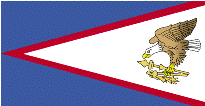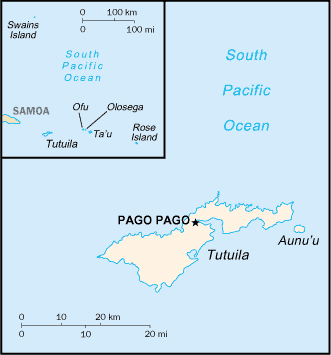|
American Samoa
|

|
Capital: Pago Pago
Population: 55,312
Brief History of American Samoa:
It is thought that the Samoan Islands were first settled around 1000 BC. They were first were first discovered by Europeans by a Dutchman, Jacob Roggeveen, in 1722. In 1768 a French explorer Lous_Antoine de Bougainville visited the islands and named them the Navigator Islands. There wasn't much contact at this time until the mid-1800's when trader and missionaries started to visit the islands.
In the late-1800's there was a dispute over the islands between Germany and the United States. The islands were split between the two countries. The American side would become the US Territory that is today American Samoa.
As a US Territory, American Samoa is somewhat self governing. Someone born in American Samoa is not considered a citizen of the United States and cannot vote in elections, but they can travel to and from the rest of the United States easily.
The Geography of American Samoa
Total Size: 199 square km
Size Comparison: slightly larger than Washington, DC
Geographical Coordinates: 14 20 S, 170 00 W
World Region or Continent: Oceania
General Terrain: five volcanic islands with rugged peaks and limited coastal plains, two coral atolls (Rose Island, Swains Island)
Geographical Low Point: Pacific Ocean 0 m
Geographical High Point: Lata Mountain 964 m
Climate: tropical marine, moderated by southeast trade winds; annual rainfall averages about 3 m; rainy season (November to April), dry season (May to October); little seasonal temperature variation
Major cities: PAGO PAGO (capital) 60,000 (2009), Tafuna, Leone
The People of American Samoa
Type of Government: NA
Languages Spoken: Samoan 90.6% (closely related to Hawaiian and other Polynesian languages), English 2.9%, Tongan 2.4%, other Pacific islander 2.1%, other 2%
Independence: none (territory of the US)
National Holiday: Flag Day, 17 April (1900)
Nationality: American Samoan(s) (US nationals)
Religions: Christian Congregationalist 50%, Roman Catholic 20%, Protestant and other 30%
National Symbol:
National Anthem or Song: Amerika Samoa (American Samoa)
Economy of American Samoa
Major Industries: tuna canneries (largely supplied by foreign fishing vessels), handicrafts
Agricultural Products: bananas, coconuts, vegetables, taro, breadfruit, yams, copra, pineapples, papayas; dairy products, livestock
Natural Resources: pumice, pumicite
Major Exports: canned tuna 93% (2004 est.)
Major Imports: materials for canneries 56%, food 8%, petroleum products 7%, machinery and parts 6% (2004 est.)
Currency: US dollar (USD)
National GDP: $575,300,000
** Source for population (2012 est.) and GDP (2011 est.) is CIA World Factbook.
Back to Geography Home Page
